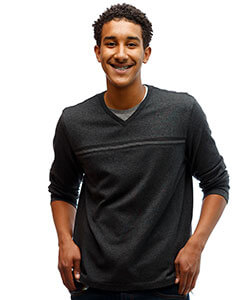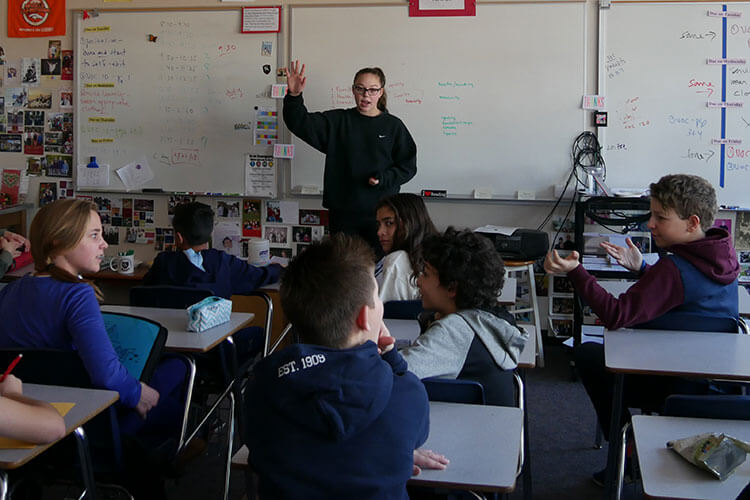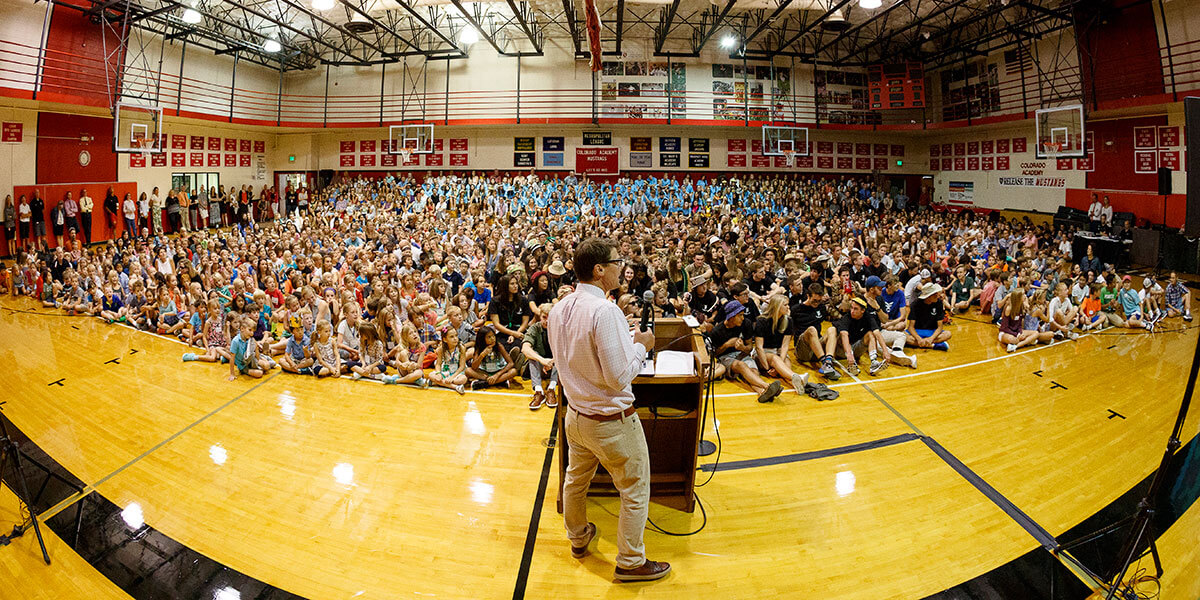Waleed Khalifa ’17 describes his four years at Colorado Academy as a time when he learned to invest in himself, prioritize his own social and emotional development, develop standards for excellence, and take pride in his achievements. Though it may seem counterintuitive, he credits his growth to CA’s willingness to let him make mistakes.

“When I would make a mistake—and I made a lot of them—[Twelfth Grade Dean and Academic Counselor] Mr. Bernstein would give me time to reflect, talk to me, allow me to learn from the mistake, and from that, growth would come,” Khalifa says. “All I needed were mentors to see my potential, and when I realized how far they had helped me come, I became determined not to mess up. I was so happy because my life changed for the better.”
A school experience like the one Khalifa describes does not happen by accident at Colorado Academy. It reflects an intentional and deliberate culture which consistently supports emotional and social wellness starting in Pre-Kindergarten, where Pre-K Director Mary Karst says her mission is to teach small children “how to be determined, how to keep working, how to fail and not be afraid, and how to support each other.” From Pre-K through grade 12, teachers, advisors, counselors, administrators, coaches, and peers weave a safety net to catch students who might be struggling emotionally and help them develop their best and happiest selves even as they tackle rigorous academics, athletics, and arts.
“Our students are motivated and ambitious, and the pressure they put on themselves can sometimes be the enemy of success,” says Head of School Mike Davis, PhD. “We have a duty to respond to the age of anxiety that we live in.”
‘You can take care of each other’
After more than two decades working with students, Director of Counseling Services Liza Skipwith knows that the anxiety some students feel—often exacerbated by social media which emphasizes the need to keep up with others and never miss out on anything—can develop into more serious mental health issues, including depression. “Students who have developed anxiety or depression sometimes have distorted perceptions of reality,” she says. “They feel they have disappointed everyone, and they lose hope for the future. They start to believe that if the here and now isn’t working, life will never work.”
As the Upper School Counselor, Skipwith meets with every incoming ninth grader individually and in small groups to build rapport, make connections that will last four years, and discuss how CA students look out for each other. She knows that if students cannot self-regulate, they will not be able to function well emotionally, mentally, or physically, and consequently their academics, arts, athletics, and social life will be affected as well.
“We drill it into the students from the start—at CA, we take care of each other,” Skipwith says. “We assure them mental health is just as important as everything else they do in school and that asking for help is not a sign of weakness—it demonstrates courage.”
Skipwith brings in speakers at developmentally appropriate grade levels to talk with students about mental health issues, including substance abuse prevention, eating disorders, sexual harassment and assault, and suicide. She attends parent meetings to assure parents that CA counselors are here to help them. She makes sure that students are trained to use the app “Safe2Tell Colorado” which allows them to anonymously report anyone they believe is struggling or hurting. She trains faculty and coaches to watch for signs that students are sinking emotionally. When she identifies a student who needs more long-term counseling, she helps families with referrals to professional counselors from a list she has compiled over 12 years at CA.

CA also creates the Community Leadership Team, comprised of more than 20 senior leaders carefully chosen and intensively trained to mentor freshman students. “I tell the seniors they are peer support counselors to the freshmen,” she says, “They are my foot soldiers in the trenches and report to me when someone is in crisis and needs help.”
Seniors also support younger students by acting as role models. In her senior speech—with some trepidation—Paige Clay ’17 talked candidly about her own struggles with body image. Afterwards, she was surprised by the many younger students who came to her to share their own struggles and to thank her for talking openly about a touchy and emotional subject. “I felt so good that I could help other students, because every year at CA there were counselors and resources that helped me succeed,” Clay says. “Now, I could give back.”
‘Valued and appreciated’
Attention to the social and emotional health of students is the foundation of every school year in CA’s Lower School, with the building of community and trust in each classroom. It starts every morning with a simple concept—as part of the Responsive Classroom Program morning meeting, every student greets each other and their teacher, hearing their names spoken with cordiality.
“This practice helps our students feel valued and appreciated,” says Kate O’Donnell, Lower School Counselor. “We believe kids have to feel safe, happy, and confident to be ready to learn.”
Throughout Lower School, O’Donnell and teachers assess students as their social and emotional health fluctuates and develops. When they see issues, they work with individual students. By fifth grade, every student has been prepared to either mentor a younger student, participate in service projects around CA, or engage in leadership activities. “We see our students grow from sweet, playful, curious Pre-K children to compassionate, kind, hard-working fifth graders ready to tackle the challenges of Middle School,” O’Donnell says.

‘They learn what to do’
Students like eighth grader Morgan Romine are key to the development of social and emotional health among CA Middle Schoolers. As a member of the Eighth Grade Leadership Team, Romine is one of more than a dozen students who receive special training and meets frequently with sixth graders to mentor them and discuss a variety of topics, including conflict resolution and friendship. Romine understands the challenges faced by younger students. “If you’re not mentally comfortable with yourself, you can’t focus on anything but the thing you are struggling with,” she says. “That one thing becomes huge in your mind.”
All Middle School students are assigned to small Advisory groups for each school year. Every day, the Advisory students meet with a faculty leader. “Students bond with their advisors,” says Kate MacKenzie, Middle School Counselor. “The teacher is one point person who tracks information about a student and is an advocate for the student, and the Advisory students become a group that serves as a home base for kids.”
Mackenzie organizes special discussions with the Advisories on a variety of topics appropriate to different years in Middle School, including sex education, drug and alcohol education, finances, internet safety, and cultural diversity competency. “The students have difficult conversations, practice good decision-making, and build character,” MacKenzie says. “They learn what to do when they are worried about themselves and others.”
Romine, who attended a different school before enrolling at CA, believes this attention to social and emotional health makes CA a different kind of school. “At my previous school, the philosophy was, ‘Yes, you feel stressed, so just ignore it,’” she says. “Here, the attitude is, ‘Let’s figure out what is stressing you and see how you can manage it.’”
‘The stair steps of emotional growth’
Upper School Principal Jon Vogels, PhD, emphasizes the word community when he talks about the many resources available to help CA teens with mental wellness. “CA is a large family, but sometimes we find that the connections that a student will make with just one adult at CA—whether it’s a teacher, a coach, a choir director, a counselor, a dean, or the head of school—that one person can make the world of difference in a student’s life.”
Often that one person is the leader of a student’s Advisory. In ninth grade, all students are placed in small groups of 10 to 12 students, with a teacher Advisor. Unlike Middle School, where Advisories stay together for one year, Upper School Advisory groups remain together for four years with the same adult leader, meeting every day. “The students grow up together, and they watch out for each other,” Dr. Vogels says. “Their leader is one adult who has eyes on a student’s well-being for the duration of high school. They really get to know students, and they are a consistent liaison for parents.”

“We genuinely cared about each other,” CA alumna Paige Clay says about her fellow students in Advisory. “We checked on each other 24/7.”
For seniors facing the anxiety-inducing prospect of college applications, CA provides another layer of emotional support from a team of college counselors. Clay remembers “crying all day” during her senior year when her dream school accepted her, but didn’t offer sufficient financial aid. In tears, she went to the office of Co-Director of College Counseling Cathy Nabbefeld. “She just simply said to me, ‘This is going to work out because whatever you do, you will succeed,’” Clay remembers. “She helped me realize I should not stress about college constantly.”
Today, Clay says she is delighted to be at The College of Wooster, where she feels that CA “over prepared” her for the challenges of college. “There are a lot of high schools that just focus on academics, but CA was different,” she says. “CA gives you the tools to be mentally and socially okay, and that means you won’t struggle in the long haul.”
‘Everyone will help you’

In an increasingly fast-paced and complex world, CA helps students face uncertainty, manage anxiety, and learn to be flexible in unpredictable situations. The message is clear. “Everyone will help you,” Dr. Vogels says. “You are not a disappointment if you ask for help.”
“We are not interested in manufacturing perfect behavior in children,” Dr. Davis says. “We are here to help them dive into learning and life and hold them accountable when they make mistakes, because that’s how you learn.”
Today, Waleed Khalifa is flourishing at the University of Colorado Boulder, using the lifelong mental health skills he learned at CA. “I’m proud to be able to say that I graduated from CA,” he says. “It’s a special school, and for me, it was a blessing to have gone there.”
